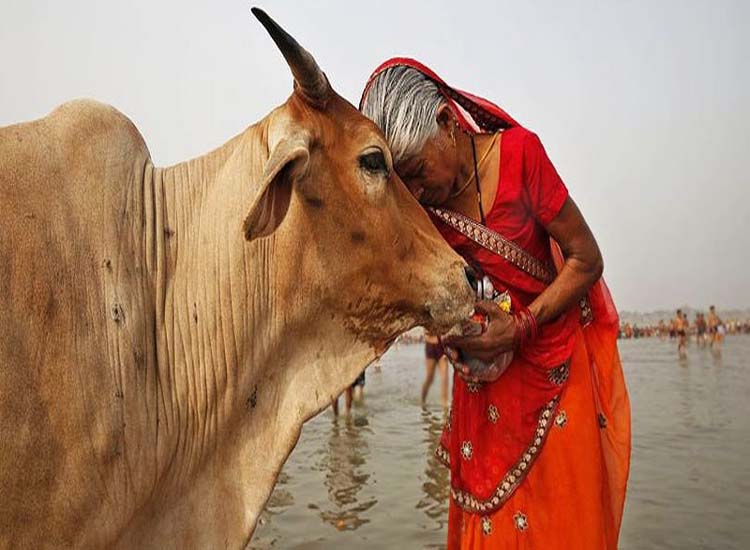Kalizhi Yuga The Cow Slaughter
If a person’s worship is desire prompted, then he should worship Me with choicest type of offerings. But a devotee without desire, can adore Me with any ingredients he could gather. In the mental worship done in the heart, all offerings should necessarily be mental.
Sr Krishna, Bhagawatam,
Skandha XI:Chapter 27, Verse 15
—————————————————————————————————
We started our evening walk and continued our talk from where we left the other day.
He: Your explanation on cow slaughter was very convincing.
Me: Yes, let me continue on that. The native cow species of our country are known as Bos Indicus or Bos Taurus. Which means a cattle with a hump on the back. You would have seen these on the Harrappan seal. The species seen in Europe and Americas are known as BosTaurin and they don’t have hump. The Bos Indicus is smaller in size and very well suited for the tropical climate of Asian countries.
But most of the cows we see now are cross breed of Indicus and European species. Many of them are not suited for our climate. They are cross breaded for higher quantity of milk and beef. However they do not stand our climate and their milking life is short. They are also prone to many diseases and some of these diseases, like the mad cow diseases and are transmitted to humans also.
The original Indian species likes of Sahiwal, Red Sindhi, Ongole, Nellor, Brahman, Kangkeyan etc,. are Heat Tolerant, Tick resistant and have low nutrient requirement because of their small size with efficient digestive system. They are not prone to human transmitting disease. They are however low milk producers, but lactating longer periods and not very much fit for beef. The Oxen are great load pullers.
Qualities of milk from these species are highly suitable for human consumption. Due to these qualities of Indicus 90% of crossbreeds are from Indicus, but all the original qualities have not gone down to the breeds as expected.
Now the trend is protecting the Indicus world over. Countries of Americas like Argentina and Brazil have started importing our species and breeding them.
Many religions of the world also hold cow as sacred.
Jainism and Buddhism with ahimsa as their basic tenet, encourages kindness towards cattle. Saving animals from slaughter for meat, is believed in Buddhism to be a way to acquire merit for better rebirth.
“Like mother (they thought), father, brother or any other kind of kin,
cows are our kin most excellent from whom came many remedies.
Givers of good and strength, of good complexion and the happiness of health,
having seen the truth of these cattle they never killed” says Buddha, Brahmanadhammika Sutta 13.24, Sutta Nipāta
The Zoroastrianism also respect cow. Guesh Urva a term in Zoroastrianism is interpreted as “soul of earth”
I In accuses some of his co-coreligionists of abusing the cow tells Zarathustra to protect the cow. The 9th chapter of the ex pounds the purification power of gōmēz – cow urine. It is declared to be a penance for all bodily and moral evils, understood as which it features prominently in the 9-night purification ritual .
In Judaism, the Hebrew Bible, talks about Red Cow as sacred and the ashes of it is used in purification process. The ritual is give in chapter 19,verses 1-14 in The Book of numbers.
Traditional Judaism considers beef permissible as food, as long as the cow is slaughtered in a religious ritual and the meat is not served in a meal. Some Jews committed to believe that eating beef is prohibited.
The ancient Egyptians sacrificed animals but not the cow, because it was sacred to Goddess was the manifestation of Hathor, the divine sky-cow, in earthly form.
In Greek,Celtic,Norse and Visigoth Myhtology, all belonging to Europe the cow was held sacred and their killing was restricted.
Even in ancient China beef eating was a taboo called niú jiè. Especially Han Chinese had this on moral and ethical value. Respect for animal life and vegetarianism were common to Buddhism, Confucius and Daoism. Chinese respected cow and it was considered sacred especially by their farmers.
In Japan like China beef eating was a taboo due to Buddhist influence, the decree in 675 AD placed a ban on all cattle slaughter, especially cow, and was in place till 1872.
In Indonesia, they still maintain the tradition of not slaughtering or eating cows, out of respect for their ancestors, who were, allegedly imitating who also did as such.
He: That is great ancient history, but what about modern times?
Me: What about our first war of independence of 1857? What was its main cause?
The rebellion was caused because the sepoys believed that the gun powder paper cartridge was greased with beef and pork meat. It brought in Hindu Muslim unity, which led to the British policy of divide and rule. This has been even now practiced by the regimes of recent times of independent India. Many Mughul rulers banned cow slaughter because of majority of their subjects were Hindus.
In Burma, a Buddhist country banned cow slaughter. During the country’s last dynasty, the habitual consumption of beef was punishable by public. A Burmese Monk, in 1885, wrote the Nwa-myitta-sa ), a poetic prose letter that argued that Burmese Buddhists should not kill cattle and eat beef, because Burmese farmers depended on them as beasts of burden to maintain their livelihoods, that the marketing of beef for human consumption threatened the extinction of buffalo and cattle, and that the practice and was ecologically unsound.
He subsequently led successful beef boycotts during the colonial era, despite the presence of beef eating among locals, and influenced a generation of Burmese nationalists in adopting this stance. In 1961 the Burmese parliament passed an Act banning cow slaughter which was subsequently repealed by the military regime.
In May 2013, 30-year-old Buddhist monk Bowatte Indrarathana Thera of the Sri Sugatha Purana Vihara self immolated to protest the government allowing religious minorities to slaughter cows.
The Cuban Government criminalized the illegal consumption of beef in 1979. The 282 and 241 of the penal code and Decree No. 255 made it a crime to kill cows. Anyone caught killing cows or carrying beef can be sentenced up to four to ten years in prison. The citizens are not eating their cattle, the Communist Party conducts routine counts of the island’s cows.
Carrying around beef is worse than carrying around cocaine. You can spend years in jail if you get caught. Nepal has ban on cow slaughter. Even in Europe the Animal welfare activists are canvassing for ban on animal slaughter.
He: You are very convincing as always. But the punishment meted out by different countries on animal slaughter, is it not inhuman.
Me: The reason behind ban on cow slaughter varies from country to country. For example in Cuba it is due to shortage of cow for milk. This aspect I discussed earlier, when I said that cow slaughter will make a land barren. Many countries with Buddhist influence, want it on ethics and religious beliefs. In Arabian countries pork is forbidden on religious beliefs and anybody there should abide by it. There you cannot say that the government cannot decide on what one eats.
Even here The Shia Personal Law Board & Islamic seminary Darul-Uloom, Deoband,have said that cow slaughter ban should be adhered to if the Government bans it, as pork in Islamic countries.
About quantum of penalty, Do you know that our constitution also stresses that India should move towards cow slaughter ban? This can be implemented only by restrictive punishment. Killing of Peacocks here will get you seven years of prison. Have we thought about that? It is all on sentiments, beliefs and economics. And prevention of cow slaughter has all these . Bye for now.
He: See you tomorrow




